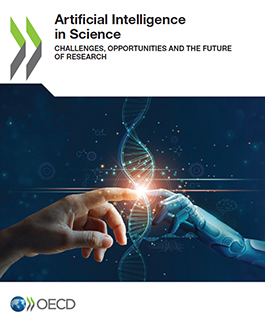New Book Examines How AI Can Accelerate Scientific Productivity
Artificial intelligence (AI) can accelerate the productivity of scientific research to advance innovation and address global grand challenges, from climate change to new contagions to the diseases of aging.
 Northwestern Engineering’s Ken Forbus authored a chapter in the new book Artificial Intelligence in Science: Challenges, Opportunities and the Future of Research (Organization for Economic Cooperation and Development Publishing, 2023) that explores the current and emerging applications of AI and examines public policy implications.
Northwestern Engineering’s Ken Forbus authored a chapter in the new book Artificial Intelligence in Science: Challenges, Opportunities and the Future of Research (Organization for Economic Cooperation and Development Publishing, 2023) that explores the current and emerging applications of AI and examines public policy implications.
“One of the most exciting frontiers in AI right now is understanding how to use and improve AI to enhance scientific research more broadly,” said Forbus, Walter P. Murphy Professor of Computer Science at the McCormick School of Engineering and a professor of education at Northwestern's School of Education and Social Policy.
Forbus’s chapter, “The Importance of Knowledge Bases for Artificial Intelligence in Science,” explains the concept of knowledge bases — or an AI system’s knowledge — and how knowledge graphs are having a revolutionary impact on AI, such as the billion-fact knowledge graphs that underlie web search and other applications.
Forbus outlines the improvements needed to support broader uses of AI in science, such as incorporating tacit, experiential commonsense knowledge, developing expressive representations for encoding scientific knowledge; and applying robust reasoning techniques that go beyond simple retrieval. He proposes the development of a domain-agnostic open knowledge network to help drive innovation across fields including medicine, science, engineering, and finance.
 Written in non-technical language by prominent researchers and practitioners, Artificial Intelligence in Science is designed for a broad readership, including policy makers, the public, and stakeholders in all areas of science. The book was published in June by the Organization for Economic Cooperation and Development (OECD) Directorate for Science, Technology and Innovation.
Written in non-technical language by prominent researchers and practitioners, Artificial Intelligence in Science is designed for a broad readership, including policy makers, the public, and stakeholders in all areas of science. The book was published in June by the Organization for Economic Cooperation and Development (OECD) Directorate for Science, Technology and Innovation.
Director of the Qualitative Research Group, Forbus’s research interests include qualitative reasoning, analogical reasoning and learning, spatial reasoning, sketch understanding, natural language understanding, cognitive architecture, reasoning system design, intelligent educational software, and the use of AI in interactive entertainment. He authored the book Qualitative Representations: How People Reason and Learn about the Continuous World (MIT Press, 2019).
Forbus is a fellow of the Association for the Advancement of Artificial Intelligence, the Cognitive Science Society, the Association for Computing Machinery, and the American Association for the Advancement of Science. A former chair of the Cognitive Science Society, he received the Humboldt Research Award and was the inaugural winner of the Herbert A. Simon Prize for Advances in Cognitive Systems.
